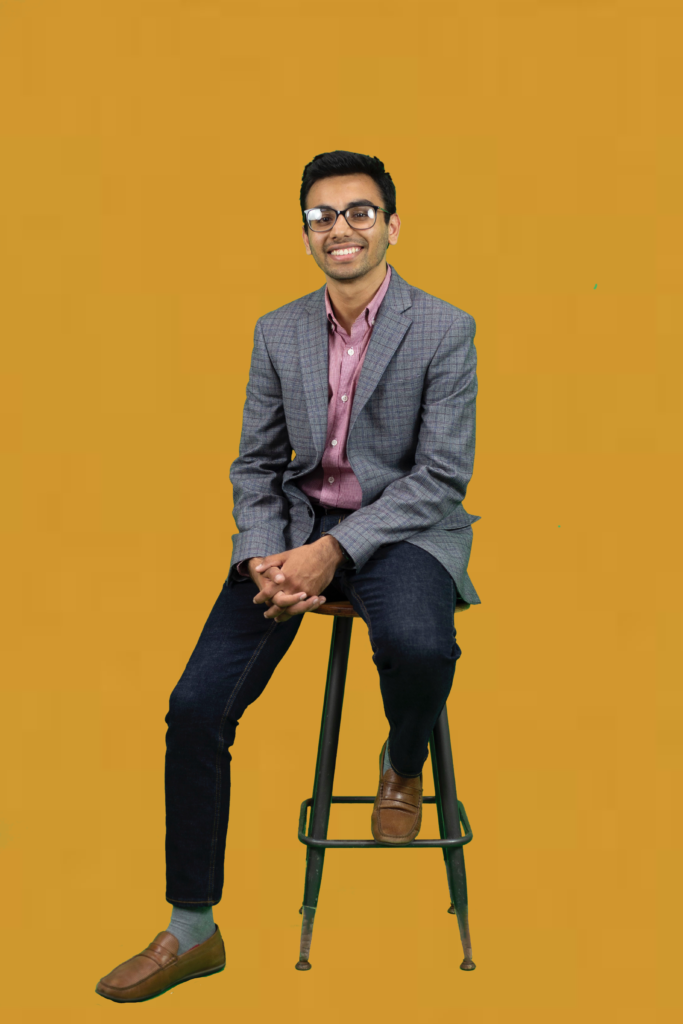Story by Anna Tabet & Photos by Ryan Feller
Children of immigrants know all too well the need to make their parents’ struggle for a better life worth something, and that doesn’t stop when they get to college. As students, their desire to carry on their parents’ legacy manifests itself in their diligent work ethic and their ability to overcome seemingly insurmountable obstacles. They display their culture like a badge of honor because they comprehend how hard their parents fought for them to be able to do so. Although many children of immigrants can agree that their backgrounds have shaped who they are today, each child has a unique story that they want to share with the world.

Elenista Lam’s mother had the experience of escaping a war-torn country before reaching the age of 4. Because of the civil war in Indonesia, her mother’s family decided to flee to China. The decision was mainly fueled by the communist propaganda being consistently exposed to them, promising them a better life. However, when deciding between potentially risking his family’s life or staying in China, Lam’s grandfather chose the safety of his family.
However, this decision to stay in China didn’t impact them for long. When a family friend with the same last name lent them their version of a green card, they were able to leave China and immigrate to Macao.
Macao ended up being the birthplace of Lam’s parents’ love story, as well as her childhood home. Lam’s parents weren’t the only ones who found love in the “Las Vegas of Asia,” however. Lam’s aunt, a working nurse, happened to find a particular American nurse cute enough to marry him in six months and move with him to Tulsa, Oklahoma. Lam’s grandparents followed in stride, uprooting their life and moving with them to Tulsa.
Unfortunately, Lam’s move to America wasn’t under such positive conditions. When Lam’s grandfather suffered from a stroke, Lam’s mother knew it was time to come to America to care for her father and prepare for her children’s futures. “Family ties are very important, especially in Asian culture,” Lam said.
Attending elementary school in America presented Lam with some unexpected issues. Seeing as the rest of her childhood was spent around children with the same cultural background as herself, being immersed in an entirely Western community made her feel out of place and unwelcome.
“My mom would pack me lunches that were filled with food that I loved and I would open it and people would be like, ‘What the heck is that?”’ Lam said. “That was when I definitely felt the push against my own culture. I didn’t want my culture. I wanted to fit into this Western view of what they wanted me to be.”
Lam struggled with accepting her culture and creating a community around her background, until she began college. After years of never having an Asian community, Lam had seemingly given up on that aspect of her life. However, witnessing an event on her college campus where Asian students were sharing the beauty within their culture freely with anyone that would witness it really sparked a newfound passion for it in her life. She now acts as vice president of the Asian Student Association and wouldn’t trade the cultural legacy she was given for the world.
“Coming to Baylor actually made me realize that I should be proud of my culture, wear it on my sleeves, embrace it and educate others about it,” Lam said.

Ahfaaz Merchant’s parents were acting selflessly on his behalf long before he was even born. Leaving India to move to Nairobi, Kenya, Merchant’s father worked at a small business, in hopes of saving up enough money to bring his wife and their future children to America for a better life. After a year of saving up funds, they made the decision to spend that money on securing the best hospital in Nairobi for their son’s birth. Although a severe setback, prioritizing the safety and security of their children was never a point of contention in their lives.
A year later, they had finally re-accumulated the funds needed to move to America and create a life with more opportunities for themselves and their children. Although it may have seemed like the difficulties were all behind them, the life they dreamed about required unwavering dedication and work from both them and their children. They all met the challenge without hesitation.
Merchant depicted his elementary school years as challenging. At home, he was immersed in his family’s culture and communicated by speaking Hindi. But at school, he had to readjust to what his classmates and teachers deemed a normal, American way of life.
“It was a bit of a challenge trying to adapt to the things going on in school,” Merchant said. “I was speaking one language at school and one language at home. So it was difficult in the sense of me having to adapt to the people and their culture.”
While Merchant struggled with school, his parents fought daily for a better way of life for their family. They both picked up multiple jobs, knowing ultimately that their hard work would come to fruition. Although it may not have been the most glamorous life, Merchant recognized that if he had a different background, he would not be half of the determined student he is today.
“It was like those stories from rags to riches,” Merchant said. “My parents came here with nothing. My dad worked at a couple dollar stores and my mom worked at a sandwich store here and there.”
Soon after, Merchant’s mother and a close family friend both attained a contract to open a store for the phone company Sprint. One small store blossomed to over 150. During this time, they also began an LED business, making them successful entrepreneurs in their own right. Merchant credits his parents’ business tactics and drive to his current career path of being a finance major with a pre-law academic track.
“For them to have brought me over here, given me the education that I have, and go to a college like Baylor University, I don’t think there’s anything in my way to not be successful,” Merchant said.

Leo Robles has never had much of a say in how he chooses to carry on his cultural legacy, because for generations, it’s always been through music. Despite the fact that his grandparents came to the United States from Mexico for more job opportunities, they never abandoned their dreams and true passion for pursuing music. This may have meant that Robles’ grandfather had to hold two jobs, being both a construction worker in the daytime and a singer in a mariachi band at night, but if it meant he could do what he loved, his family was willing to do whatever they needed to do to make it happen.
“My grandpa technically had two jobs,” Robles said. “So it was really onto my grandma, my dad and his siblings to keep the household together.”
Although Robles’ grandparents and his father had to work hard to maintain both their economic security and home life, they never struggled to preserve their Mexican culture. This pride in their cultural background trickled down to Robles and is still something he cultivates in his daily life. Whether that be through living in “Little Mexico” in Houston, or by being an officer in the Hispanic Student Association at his school, he always finds a way to stay connected to his roots.
When not immersed in a community that shares his culture, Robles uses his background as a sort of icebreaker with people. His willingness to be open about what he’s experienced and his Mexican heritage has allowed him to forge relationships with people from all different walks of life, which is something he’s truly come to take pride in.
Robles didn’t hesitate when questioned how he wanted to carry on the cultural legacy that’s been passed down to him from his parents and grandparents. He truly sees music as a main defining factor in who he is as a person today, just as his father and grandfather before him saw it, so he saw it to be no different in regard to his future children.
“Since my grandpa was a musician, and my dad became a musician, I, in turn, wanted to be a musician,” Robles said. “And I still even want my kids to be musicians.”
Robles derives much joy from speaking on his family and sharing his culture through the music he consumes and takes part in frequently. Something as simple as making a picture of his father and grandfather in their mariachi uniforms the background of his Spotify playlist speaks volumes to how fondly he feels toward his Mexican culture.

Roy Mourad lived the majority of his life in Lebanon. He built a community at his high school, was engrossed in his Lebanese culture every day and fell in love with the rural landscape that defines Lebanon. Mourad made a life for himself in Lebanon, which made it all the more difficult when his parents made the decision to move his family to America in 2014.
Moving at any age or distance is difficult, but moving from the Middle East to the United States presented Mourad with some challenges. Thankfully, the private school he attended in Lebanon had taught him English, so there wasn’t much of a language barrier to overcome. However, he still felt disconnected from the world he had always known and admired.
Mourad reminisced on the beauty of Lebanon’s landscape, citing the ease of traveling from the beautiful beaches to the towering mountains as one of the main things he missed once he moved.
“My grandpa used to take me to a different countryside every month,” Mourad said. “I miss feeling like I live in a rural country.”
Alternately, however, being separated from his culture and having to witness and live in American society provided him with some unique perspective. Mourad noticed the difference in the kind of intelligence required to live in both cultures. He explained the need to be able to know your way around certain villages in Lebanon, whereas in the United States academic intelligence is more frequently relied on and used.
“Growing up in Lebanon, you have to be street smart,” Mourad said. “There’s a common saying, ‘Wherever you throw a Lebanese person, they always land on their feet.’”
Since initially not wanting to move from Lebanon, Mourad said he now feels settled into his life in America. His parents opened up a Lebanese restaurant in Houston, giving them the ability to share their food and culture with the area. He has also been able to connect to his culture and learn about other Middle Eastern cultures through becoming an officer of the Middle Eastern Student Associate on his college campus.
Although not currently living in Lebanon, Mourad stayed firm on his need to pass on his cultural legacy to his children. Whether that be through teaching them Arabic or walking them through the steps on how to make shawarma, he knows his children will be just as proud as he is to be Lebanese.

Stacey Hermenn
Stacey Hermenn has known the depth and resiliency of her Mexican culture her entire life. The Bracero Program, a farm labor agreement signed between the United States and Mexico, allowed her grandparents to move to California. Despite their distance from their home, they maintained their culture so strongly that the current generation still feels an intense connection to their Mexican heritage.
Hermenn felt incredibly grateful for the ability to connect directly to the culture of her ancestors when they periodically visited her family’s hometown in Comanja, Michoacán. She’s reminded of her grandmother teaching her how to make tortillas and other authentic Mexican food. She feels enchanted by the music that pulls the community together. And she said she feels welcomed by each and every person she encounters.
“The people are very genuine,” Hermenn said. “They’re really humble. They make you feel at home once you get there. That’s why whenever I come back, I feel like I’m leaving a piece of my heart out there.”
Although her family wouldn’t be where they are currently in life without the work her grandparents put in, Hermenn still accredits much of her personality and disposition to lessons her parents taught her growing up. She said she never once felt shame or a need to hide her culture from her community when she was younger. Instead, she was taught to take pride in her background and be open and kind to everyone she encounters.“My parents raised me to be humble, always be genuine to everyone, and when people criticize you, my dad would always say never take it badly,” Hermenn said. “Take it as an example to do better and that’s the way I’ve taken it my whole life.”
Hermenn said she always has and will hold her family and culture very near to her heart. However, her family’s love and prioritization of God is never forgotten through their repetition of the phrase “Primero Dios,” or God first. Hermenn never once questioned whether or not she would carry on her cultural legacy to her future children. Knowing that her culture made her who she is today, she knows that her children would benefit from the same lessons and background that she was accustomed to her entire life. “My culture is something to love forever. It’s in my blood. It’s a part of me,” Hermenn said. “It’s something I can’t remove. If I lose it, it’s like losing my identity. And that’s why I’m proud to be Mexican-American. I always introduce my Mexican and American side because I have both to be proud of.”
A butterfly paid Hermenn a visit at the end of the interview. She explained that in her culture, a butterfly landing on someone signifies a visit from an ancestor. To many, it may have just seemed like an interesting occurrence; but to Hermenn, it was as though her ancestors were thanking her for sharing her pride in her culture with those she encounters.

Ekene Ijei was immersed in Nigerian culture very early on in her life. Speaking mainly Ibo, the language of her family’s tribe in Nigeria, and comprehending the dynamics and cultural traditions of Nigeria defined much of her childhood. This was all thanks to her grandmother whose lack of fluency in speaking conventional English and eternal pride in her culture translated easily to the granddaughter she helped raise.
Ijei is still influenced to this day by the many traditional Nigerian principles that she was immersed in as a young girl. One main one is her unwavering acknowledgment of the reverence of elderly people. This immensely respectful view of the elderly is one that Ijei witnesses a lack of daily in current American society.
“I am shocked sometimes when I see someone not giving up their seat to an elderly person or letting an older person cut in front of them in the grocery line,” Ijei said. “It’s shocking but I just have to remember that it’s a different culture. It doesn’t mean disrespect here. But if I did that in Nigeria, like if I didn’t greet an elderly person when they came into the room, people would look at me like I’m crazy.”
Other than the view of elderly people as royalty, Ijei credits Nigerian pride as an overall positive in her culture. She described the pride she witnessed Nigerians display as one unmatched by many other cultures she’s encountered. Similarly, Ijei displays her admiration for her culture through food. Her grandmother frequently cooked traditional Nigerian meals for neighbors and fellow church-goers, allowing them to partake in her culture. Ijei now parallels that in the cultural legacy she aims to carry on, mainly through both her faith in God and her desire to pave bright paths for the African American community.
While Ijei now has love for her Nigerian background, it wasn’t the easiest getting to that point. Growing up in St. Louis, Missouri, in a predominantly white community and school district, continuously made Ijei feel like an outlier. She found herself comparing her achievements and looks to the standards of those around her. Now matter how well she did, she felt as though there was always a contingency because of the color of her skin.
“I really love Nigerian pride and I wish that was something I learned to assume earlier in my life,” Ijei said. “I grew up in a predominantly white neighborhood and school and I just felt like I was always ‘other.’ And yeah, I’m ‘other,’ but I could’ve been prideful in being ‘other.”’
Coming to college, however, provided Ijei with an African-American community that shared the same drive for excellence and understood the obstacles she had to overcome to achieve everything she has. Because of this, she was able to view herself and her background in a positive light, as well as being given the opportunity to grow from the pain and anger she experienced in school.
“Coming to college really helped me learn to love myself and white people as well,” Ijei said. “And I didn’t know that love for both could coexist.”

